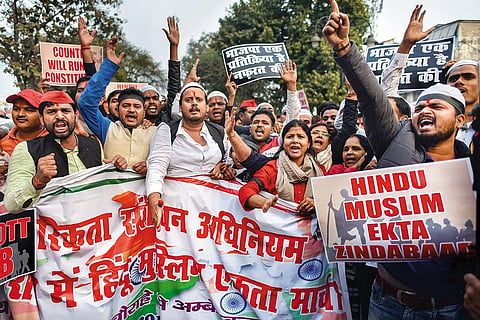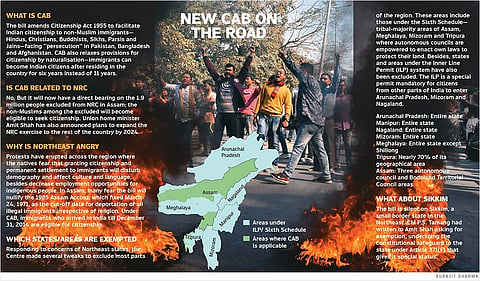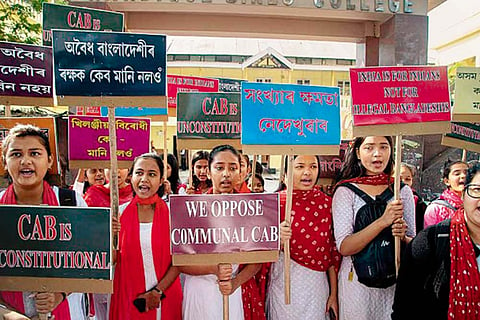A line stretches out from Assam and wraps itself around India, like a new Tropic of Cancer or an invisible Radcliffe Line, but changing meaning along its path. To understand it, one must go back to its place of origin. On December 11, 2019, as the Rajya Sabha passed the Citizenship (Amendment) Bill, Assam was being convulsed by a monumental surge of anger. In its history, marked by 600 years of uninterrupted Ahom reign, Badan Barphukan is one of the most reviled men, his name associated with what’s considered the highest treason—in 1817, he invited the Burmese army to help him capture the throne. This led to the fall of the Ahom empire and capture of Assam by the British. Since then, the word ‘Badan’ has become synonymous with ‘traitor’ in Assamese. Cut back to December 2019. Protests had erupted across the state—huge masses of people on streets, smoke billowing out of burning tyres, curfew, the army on standby, and a Kashmir-like internet lockdown, albeit temporary. Among the crowd, denouncing the contentious bill, using the innocuous-sounding shorthand CAB, many are identifying present-day ‘Badans’—politicians seen as having sacrificed the state’s interests at the altar of Hindutva politics. Heading the list are leaders who once led the six-year-long movement against what later gained currency as “illegal migration” (or “illegal infiltration”), especially from Bangladesh.
Assam Burning! Is India Ready To Handle After-Effect Of Citizenship Amendment Bill?
The Parliament nod to Citizenship Amendment Bill has raised questions about secularism. Are politicians sacrificing the state's interest at the altar of Hindutva politics?
Illegal migration. Pause on the two words. For decades now, it has been the leitmotif of Assam’s politics, and to an extent that of the Northeast; it has made political leaders out of students, catapulted parties to power and, tragically, even led to mass killing of innocent people. The phrase itself has migrated to the rest of India, while never relieving Assam of its pincer-grip. Recently, it led to a massive, controversial exercise in the form of updating the National Register of Citizens. The NRC identified a staggering 1.9 million—originally over four million—as people whose citizenship is in doubt. Yet, most Assamese backed the NRC, hoping it would identify the “lakhs” of illegal migrants, paving the way for their deportation. It was a sprawling mess, full of loopholes, and it is in those gaps that a new, mutating law took final shape—beginning from its first avatar in 2016 to the final one of 2019.
Dissent in many hues
Protests have many layers. And different contexts for different people. Even in the same country. A secular liberal sitting in Delhi may point to the anti-CAB protests in Assam to make a political point. The same point that opposition lawmakers raised in Parliament during the debate on the bill—how CAB goes against the very soul of India’s Constitution by making religion a classifying criterion for granting citizenship. But it would seem difficult for others to understand why the Assamese-speaking supports the NRC but opposes CAB, though both are allegedly designed to exclude Muslims. Indeed, the central leadership of the BJP, which wrested its first majority in the Assam assembly in the 2016 elections, itself seems unable to comprehend that the Assamese antipathy towards the “illegal migrant” is faith-neutral: it does not discriminate on the basis of religion. The Hindu refugee from East Pakistan/Bangladesh is as much a “non-native” as the Muslim from the same geography.

Samajwadi Party workers hold an anti-CAB protest in Allahabad while appealing for Hindu-Muslim unity.
But then, the BJP has never shed its sentiments either: identifying the Muslim as the problem, and accusing the Congress (and the Left in Bengal) of blinking at huge Muslim ingress for political profit. With CAB, it couches that in terms of what it calls India’s “historical obligation” towards persecuted Hindus in neighbouring countries. The bill itself is clear in its vision of facilitating citizenship to persecuted “Hindus, Sikhs, Buddhists, Jains, Parsis or Christians” from Afghanistan, Bangladesh and Pakistan who sought refuge in India till December 31, 2014. ‘Muslim’ is conspicuous in two ways: by absence in the list of those who qualify, and exclusive presence in the list of origin countries. No Myanmar there, though Rohingya refugees qualify in every respect as a persecuted minority. And strikingly, no Sri Lanka either, so even the thousands of Hindu Tamil refugees from there are left out of CAB’s ambit. Both Myanmar and Sri Lanka are non-Islamic countries.
Back in India, the BJP’s election manifesto in both 2014 and 2019 had mentioned a law to confer citizenship on persecuted minorities from neighbouring countries. This was proposed as a significant alteration to the original law that defined Indian nationality—the Citizenship Act of 1955, which largely defined that status in terms of descent (jus sanguinis or ‘right of blood’) as against a right acquired by being born in a country (jus soli or ‘right of soil’, the norm in the Americas). CAB introduces a new element: a right acquired, roughly, by belonging to what are known as ‘Indic’ religions. Although the latter seems flexible: the Parsi religion is in, as is Christianity, only Islam is out.

Party leaders, including Union home minister Amit Shah, had told voters fairly unambiguously ahead of the 2019 Lok Sabha polls that CAB was on top of their agenda. Yet, Assam overwhelmingly voted for the BJP and its allies. In 2014 and in 2019. And also in the 2016 assembly polls. Now, however, Assam is discovering a fundamental mismatch between its worldview and that of the regime it voted in. Assam, of course, is a macro version of what is happening elsewhere in the Northeast. Tripura, a state where Bengali-origin settlers far outnumber the natives, is burning too. Violent protests, internet shutdown, paramilitary deployment…all the stages of normality being shattered were reached before the state government bought a tenuous peace by promising to seek exemption from the Centre on the lines of other Northeastern states (see graphic).
The CAB is now like a flooded river that has far overflown its original channel. The ramifications are far bigger, truly national in fact—and the voices of dissent too are likewise emanating from across India’s map. Protests were seen in Patna, Lucknow, Allahabad, Delhi, Mumbai, Bangalore…. Muslims see this as yet another attempt by the Hindu right-wing to subjugate the community, yet another step towards ‘Hindu Rashtra’. For secular liberals, the bill smacks of a religion-based bias; they see it as an extension of similar actions, including the abrogation of Article 370 in Kashmir, a Muslim-majority region. AIMIM lawmaker Asaduddin Owaisi tore a copy of the bill in Parliament and accused the government of “hating” Muslims, conspiring to make them “stateless”.
A historical Hindu-Muslim ‘faultline’ often plays out in the Northeast too, but there the chasm is ethno-linguistic rather than religious. Assam’s vociferous protests against CAB stem from the old Assamese-Bengali divide, from the primal fear of being overwhelmed by Bengali migrants, who now constitute its second-largest linguistic population. Census data shows Assamese speakers declined from 48.80 per cent in 2001 to 48.38 per cent in 2011; the percentage of Bengali-speaking increased from 27.54 to 28.91 in the same period. Tripura too is often cited as the classic case of “settler colonisation”—waves of East Pakistan/Bangladesh refugees turning the native Tripuris into a minority, taking control of politics and business. It’s this fear that Shah sought to address, saying the government has initiated steps to implement Clause 6 of the 1985 Assam Accord, which has provisions for constitutional safeguards to protect Assamese language and culture. For Bengali-speaking Hindus, most of whose roots lie in East Pakistan, the CAB would help them gain acceptance in a region where they have often faced harassment and ridicule as the “outsiders”.
Hail the CAB
For critics, the government has its points down pat. Its defence of the bill was sharp and caustic. Shah gave a point-by-point rebuttal to the Opposition, which appeared caught between their own political compulsions and democratic obligations. The margin of victory for the government in Rajya Sabha’s approval of the bill—125 to 105 —shows it had done its homework. Shah ensured that he also tried to allay Muslim fears saying they “were, are and will remain Indian citizens”.

A girl carries a hangdang, an Assamese sword, during an anti-CAB protest .
The niggling points remain, though. If the government’s concern wished to hold up a mirror to neighbouring countries, the exclusion of the minority Ahmadiyas of Pakistan seems striking. And the Rohingyas are clearly fleeing ethnic cleansing. Not to mention the Lankan Tamils, whose exclusion was raised by those like DMK lawmaker Kanimozhi. Derek O’Brien of Trinamool Congress was more dire, as he described the bill as straight out of the “Nazi playbook”. Congress’s Anand Sharma questioned if the government would also build “concentration camps” to house the migrants. While that may be far-fetched, Muslims do see a grand design in the detention camps meant to house illegal migrants till they can be deported. Assam already has five, another is being built. Two are coming up in Bengal.
Also Read | OPINION: Noose Around Our Necks
Of course, they will potentially come into play later. The real fallout—material and logistical—of CAB can happen only in tandem with something else. That will be when the government rolls out the pan-India NRC, an exercise similar to the one in Assam (the outcome of which the BJP rejected). Shah has set a deadline for completing the countrywide NRC by 2024, coinciding with the next general elections. Assam will have to go through the whole process again.
In Bengal, a state with a large number of Hindu migrants from Bangladesh, the BJP is hoping to gain from CAB in the 2021 assembly polls. However, initial public reaction to the legislation was mixed. A few protests were held in Calcutta and the districts. Ranjit Sur, a senior leader of the Association for Protection of Democratic Rights, says that two new features incorporated in the bill will make it difficult for Hindu migrants “in proving that they are victims of religious persecution in their country of origin”. There has already been anger and opposition against the proposed all-India NRC, with chief minister Mamata Banerjee leading the charge.

Numbers Game
That the number of people deemed “foreigners” will be staggering in a countrywide NRC is a safe guess. What is, however, still in the realm of conjecture is the numbers that could benefit from CAB. Assam BJP spokesperson Pabitra Margherita puts the number at “around five lakh” and adds, “It’s not that one crore and some lakhs would be coming (to Assam)”. The government has said that those who get Indian citizenship under CAB will not be given residency only in Assam but also in different states. In a smallish region where resources are scarce, conflicts can only aggravate—on linguistic and religious lines. It was this very point that award-winning filmmaker Jahnu Barua was trying to make when he withdrew his latest venture Broken Window from the state film awards. “The Assamese community is language-centric. There are people from all religions and we want to remain like this. Language is everything for us. If we lose that, what will happen?” he said. This may appear a strange logic to oppose CAB but in the Northeast identity has always overridden all other considerations. It is also the reason why Manipur insisted on being included in the inner-line permit (ILP) regime, a system dating back to the British rule that will now require all non-Manipuris visiting the state to carry the official pass for entry. The ILP regime also covers Arunachal Pradesh, Nagaland and Mizoram, which means they will be unaffected by CAB. Also out of CAB’s sweep are autonomous council areas in Assam and Tripura, which fall under the Sixth Schedule of the Constitution. This effectively means that barring the plains of Assam and some parts of Tripura, CAB will have no effect on the northeastern states.
Assam and Tripura need careful handling. Many see a Kashmir-like response by the government to the backlash there. But the AASU, which once spearheaded the anti-foreigners movement, has warned that no force can stop protests against CAB. “We have proved that in hour of crisis, we the people of NE are one…we want to tell the Centre that our protest will be even stronger in coming days,” says AASU chief advisor Samujjal Bhattacharya. In a town in upper Assam, a flag of the banned ULFA was seen hanging from a gate of an educational institution. A return to arms for Assam’s angry youth will be the worst possible thing to happen to the state, which has just started to forget the nightmare of the bloody eighties and nineties. For Muslims across India, despite the assurances, it would seem like the onset of another.
By Anupam Bordoloi With inputs from Abdul Gani in Guwahati, Rajat Roy in Calcutta and Preetha Nair in Delhi
Tags